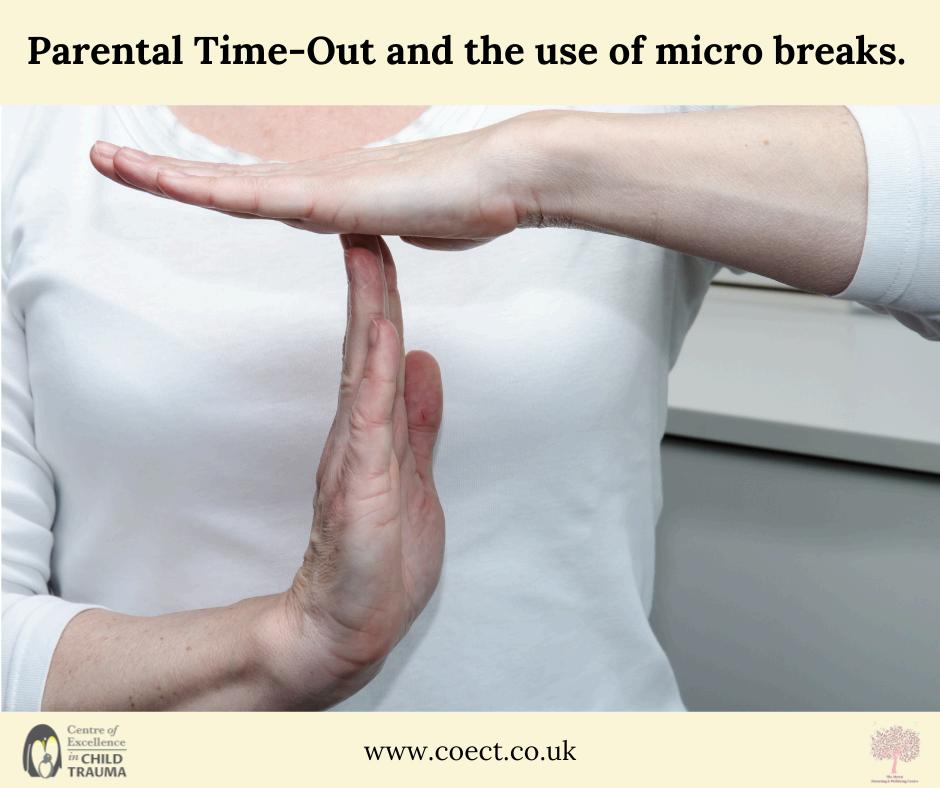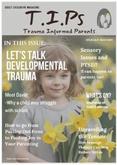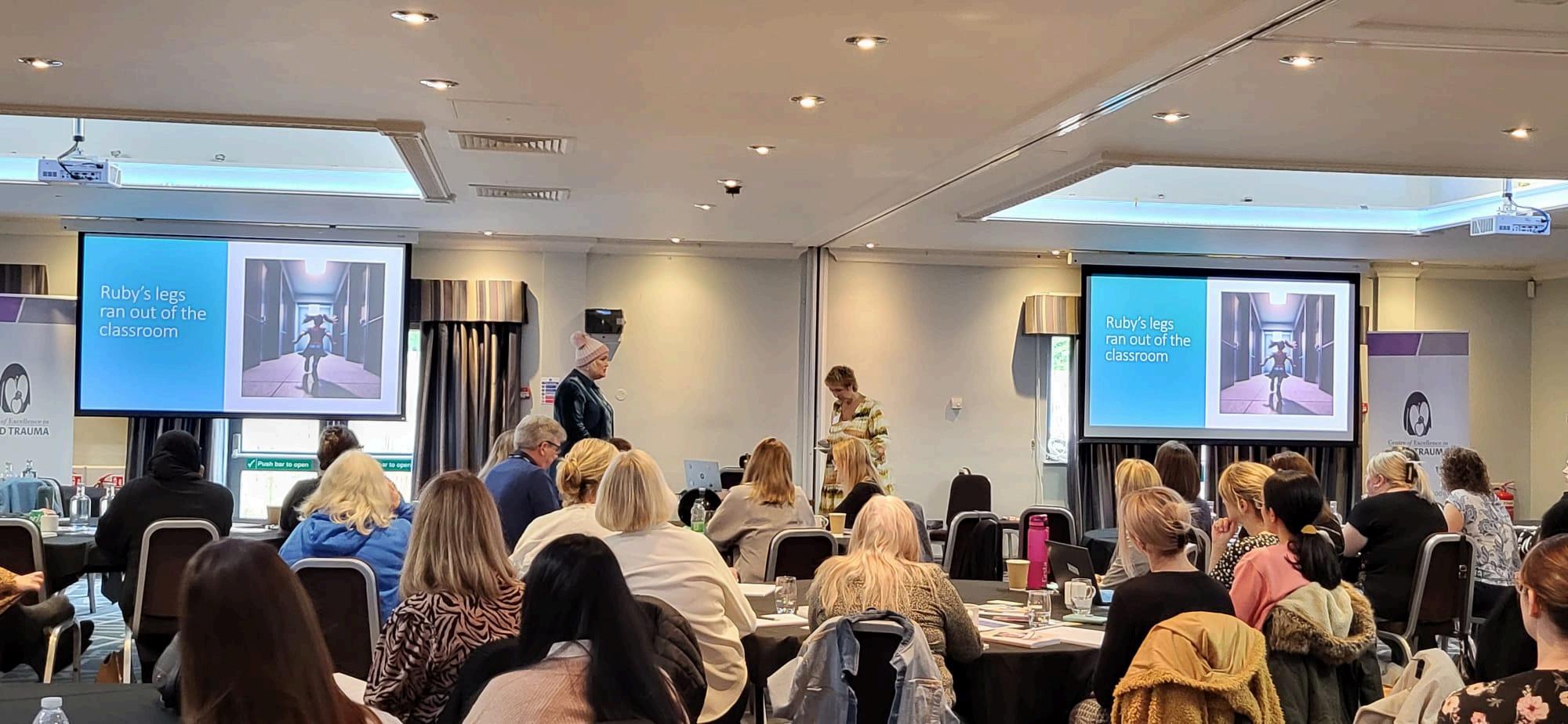T.I.Ps "THROWING WATER ON THE FLAMES NOT THE SMOKE ALARM" Understanding Behaviour as a mode of communication
ExecutiveEditor-SarahNaish SarahisaTherapeuticParent,an Adopteroffivesiblings,Bestselling internationalAuthor,Keynote Speakerandfounderofthree IndependentTherapeuticFostering Agencies SarahisalsoandcofounderandCEOatTheCentreof ExcellenceinChildTraumaC.I.C.
ExecutiveEditor-SairPenna Sair(Sarah)isaTherapeuticParent, Author,ParentCoachandHavening practitioner Sairisalsoco-founder andDirectorofTraining,Qualifications &QualityatTheCentreofExcellence inChildTraumaCIC
ManagingEditor-Kathryn Talbot
Kathrynisco-founderand managingeditoroftheTIPs magazine,atTheCentreof ExcellenceinChildTraumaC.I.C specialisinginpublicrelations.
Contributor-GarethThomas GarethisaKinshipCarertothree children,andhasvolunteered withchildrenforfifteenyears He hostsandproducesthenew CoECTPodcastseries"Trauma Talks".GarethisalsoaSenior Trainer,AmbassadorforWales andDirectorofStrategyand CommunicationsatTheCentreof ExcellenceinChildTraumaC.I.C.
Contributor-DaveEdwards DaveisaConflictManagement& Point-of-ImpactCrisisIntervention Trainer HeworkswithinFamily Servicesspecialisinginenabling parentswiththeknowledgeand implementationofde-escalation strategies,andsupportsparents andagenciesincasesofchildon parentviolent.
Contributor-JessicaSpenceley Jessicaisatherapeuticsocial workerwithover20yearsof experiencehelpingadoptiveparents navigatetheirparentingjourneys usingtheattachment-based, trauma-informedparenting approachofTBRI®
Contributor-LauraTaylor LauraTaylorisanindependent SocialWorker,TraumaInformedand ResponsiveTrainer,Practice Educator,AuthorandKeyNote Speaker YoumayhaveseenLaura insomeofourtrainingandwebinars assheregularlysupportsCOECT withourbusytrainingschedule
ContributorSarahHanratty SarahisaClinicalNutritionist specialisinginthegut–brain connectionandsupporting mentalandphysicalwellbeing. Sheworkswithchildrenand adultstorestorebalance,build resilience,andthrive
Hello Everyone,
Welcome to the September edition of TIPS magazine! Can you believe it’s already that time of year again, that the summer holidays may seem a distant memory and school has started for those who attend. We are also now on our 17th edition of TIPS!
As we transition into from Summer to Autumn, many of us are gearing up to survive the hustle and bustle of school and work life, which can sometimes lead to feelings of overwhelm, especially for parents In this edition, we’ll also explore how to interrupt parental compassion fatigue, helping parents find balance and support during the busy weeks ahead
In this issue, we’re excited to explore the theme of behaviour as a mode of communication. It’s fascinating how our actions can speak volumes, often telling stories that words can’t quite capture, and this is similar for our children Often their behaviours tell their story when their words cannot
We also have an article on the new Level 4 Trauma-Informed Practitioner Diploma has just launched This customised qualification, which is independently accredited with NCFE CACHE and ACCPH, is a fantastic opportunity for those looking to deepen their understanding and skills in supporting individuals who have experienced trauma Whether you’re just starting out in social care or you’ve been in the sector for a while, the diploma is sure to be a valuable addition to your toolkit
As always, we would love to hear from you Do get in contact with us by emailing tips@coect co uk
Warmest wishes
Sair, Sarah & The Team at The Centre of Excellence in Child Trauma C I C
Challenging Behaviour Whenadoptiveparentsreach outtome,it’susuallybecause they’restrugglingtomanage theirchild’sbehaviours Not listening Explosivereactions Swearing Meltdownsthatseem tocomeoutofnowhere Parents havealreadytriedeverything theycanthinkof–rewards, consequences,stricterroutines, takingparentingadvicefrom friendsandfamily–butnothing seemstostick
It’s exhausting, discouraging, and lonely
That’swhereTrust-Based RelationalIntervention®(TBRI®) comesin TBRIisatraumainformedparentingapproach thathelpsyoumovebeyond behaviourmanagementinto somethingdeeper:building lastingconnection,meetingyour child’sholisticneeds,and guidingbehaviourthrough compassionratherthanfearor control. Atitscore,TBRIisabout helpingyourchildhealfrom earlytrauma,andthegreatest sourceofthathealingisyou.
Buthowdoyoubuildthosehealing connectionswhenyou’re constantlyincorrectionmode,just tryingtogetthroughtheday?TBRI helpsmakeconnectionpossible eveninthehardestmoments,and
thesepracticalstepscanshow youhow
StepOne:ShiftYourPerspective Thefirststepisreframinghowyou seeyourchild’sbehaviour When you’reexhaustedandtriggered, it’seasytointerpretyourchild’s actionsaswilful,disrespectful,or manipulative Butforchildren whohaveexperiencedtrauma, behavioursarerarelywhatthey seemonthesurface
Insteadofasking“HowdoIstop thisbehaviour?”,tryasking“What isthisbehaviourtryingtotellme?”
WhentheparentsIworkwith begintoreflectthisway,they oftendiscoverthatunderneath theirchild’sbigbehavioursarebig feelings:rejection,grief,jealousy, fear. Theseinsightsdon’texcuse thebehaviour,buttheydo changethewayyouapproachit. Howyourespondtogriefisvery differenttohowyourespondto intentionaldisrespect.
Thisshiftdoesn’tjustleadtomore empathy–itleadstomore effectiveparenting.
StepTwo:FocusonConnection BeforeCorrectionFeelings
TBRIteachesthatconnectionis thefoundationofparenting.It’s thestartingpoint,notthereward forgoodbehaviour.
Whenyourchildisdysregulated, yourconnectioniswhathelps bringthembacktoaplaceof safety Youcandothisthrough eyecontact,awarmtoneofvoice, agentletouch(ifwelcomed), sharedlaughter,orsimplysitting closeandstayingpresent
Offeringconnectionmayfeel counterintuitive,oreven permissive,especiallywhenyour childisshoutingatyouor throwingthings However,showing yourchildthateveninhard moments,youaresafe, consistent,andemotionally availablebuildstrust–something manyadoptedchildrendeeply need,butstruggletoaccess
StepThree:MeetNeedsProactively Manychallengingbehavioursare drivenbyunmetneeds:physical, emotional,sensory,orrelational.
TBRIencouragesyoutomeetthose needsproactively,ratherthan reactingtothefalloutwhenthings gowrong.
Someexamples:
Physicalneeds: Isyourchild tired,hungry,oroverstimulated? Aquicksnackormovement breakcangoalongway
Emotionalneeds: Hassomething triggeredoldfeelingsofrejection orloss? Yoursteadypresence andempathyhelpre-regulate Relationalneeds: Isyourchild seekingattention? Intentional one-on-onetime,eventen minutesofchild-ledplayor generalplayfulness,canbuild securityandreducetheneedfor “actingout”
Byanticipatingandmeetingneeds, youcanoftenpreventthe behavioursbeforetheystart
StepFour:OfferGentleGuidance
Whencorrectionisneeded,TBRI offersstrategiesthatarefirm,clear,
andkind.Disciplineisn’tabout punishment–it’saboutteaching Andteachingismosteffective whenithappensinthecontextofa trustedrelationship.
Insteadof“Youneedtocalmdown oryou’regoingtoyourroom,”try, “Let’stakeafewdeepbreaths together I’mheretohelp”
Boundariesareimportant,buthow youholdthemmatters.
AFinalThought Ifyou’reparentingunderdifficult circumstances,knowthatyou’re notalone,andyou’renotdoingit wrong. Parentingachildwitha historyoftraumaiscomplicated Andwhenthetraditional approachesdon’twork,itdoesn’t meanyou’refailing.Itmeansyou needadifferentframework
TBRIoffersyouthatframework, alongwithalotofhope.Because everytimeyouchoosecuriosity
overcontrol,connectionover correction,andcompassionover frustration,you’rehelpingyour childrewiretheirbrain,restore trust,andexperiencethekindof healingonlyasaferelationship canoffer
Andthatrelationshipstartswith you Jessicaisthefounderof NurturedBelonging,whereshe helpsadoptiveparents understandtheirchild’s behaviourthroughatraumainformedlens,buildstronger connections,andsupport healing.
TolearnmoreaboutTBRIor connectwithJessica,visit https://nurturedbelonging.com/
Is the child or young person in your care showing signs of frustration and anger, manifesting as aggression and violence towards you and other family members?
We can provide you with effective de-escalation tools to help support them during their emotional challenges.
Find out more about this Training https://tinyurl com/mnya3t5j or scan the QR code
The Behaviour Assessment of Impact and Resolution Tool (BAIRT) Tuesday 14th October 2025
10:00 am - 3:00 pm Via Zoom
£120 plus VAT
To book a place contact us info@coect.co.uk or follow link below:
https://tinyurl.com/sccb9759
01453 519000
Professional Training for Career Growth
Are you a social worker, therapist, or a skilled therapeutic parent looking to enhance your skills in therapeutic parenting and fostering?
Join Sarah Naish for an insightful and interactive BAIRT Training Day!
What is the BAIRT? The Behaviour Assessment of Impact and Resolution Tool (BAIRT) is a groundbreaking interactive assessment tool designed to identify and address issues that may impact the stability of families and children.
This training will equip you with the knowledge and skills to use BAIRT effectively, ensuring better outcomes for the children and families you support.
Written By Dave Edwards
Wemayhaveallencounteredthe scenariowhentheschooldayends andweexperienceatidalwaveof negativeemotionfromourchildren. Whetherwecollectthemfrom schoolortheycomeinthedoor andweask,‘howtheirdayhas been’andfromnowhereitfeelslike wehavesteppedonalandmine. Thismaybeintheformofabusive andaggressivelanguage,their bagsthrownonthefloorandon baddaysviolencetowardsus
Thealternativeresponsecanbe equallyasnegativeintheformof blankinguscompletelyand retreatingtotheirroomanda refusaltoengageinany communication. Tounderstand whytheyreactinthiswayitis importanttoknowwhatisgoingon withtheiremotionsandresponses tostressfulsituations,peerpressure anddevelopingpositive relationships.
Whenwearefeelingstressedor underpressureitinhibitsourability tothinklogically,andouractions arepredominantlybasedonan emotionalresponse.Wemay misinterpretbodylanguage,toneof voiceandlackofeyecontactas disrespectorrudeness Thisiseven moreevidentwithourchildren, who’sbrainsandnervoussystems arestillinthedevelopingstage,and havenotyetdevelopedthecoping
strategiesthathopefullywehave beenableto.
Thismeansthattheirreactionstend tobeinstinctiveandcanfeelvery personalforuswhentryingtodeal withthis.Theymayhavebasicunmet needscausedbyeventsduringthe daythatmeantheyarehungry, dehydratedoremotionallydrained fromtryingtomasktheirdifficulties
Thiscouldbefallingoutwiththeir friends,beingtoldofforembarrassed byateacher,oraperceivedfailure ontheirpartjudgedagainstan unrealisticexpectationofthemselves. Somechildrenuseeducationto makethemselvesfeelbetter,orcover overotherareasthattheydon’tfeel comfortablein Whenthisis challenged,theydonotknowhowto dealwiththefeelingsoffailure.This canresultinfearthatwemaythink lessofthemandratherthanadmit thisfear,whichtheyfindreallytricky, theyprovideuswithaclearand obviousreasontobecrosswiththem andthereforeavoidhavingtoshare difficultoruncomfortable information
functionwhenmemoriesarecreated. Thisincludestheotherareasofthe bodyandthenervoussystem
Childrenwhohavesufferedtrauma maylosetheabilitytobuildan accuratenarrativeaboutincidentsthat makessense Traumaimpactsshort termorworkingmemoryandtheability torememberinstructionsand understandingwhatisrequired,and thisthencausesrepeatedperceived difficultiesandweaknesses,thatfeed ournaturalnegativebiaswhen reviewingevents
Weneedtobeawareof,orthinkabout, thepossiblereasonsfortheiremotional statewhenwearepreparingto welcomethemhome Thiscould involveknowingtheirtimetable,days andteachersthatgivethemthemost homework,oriftheyhaveany upcomingtestsintheirweaker subjects
Recognisingthesestressfulfactorscan allowustopreparemoreeffectivelyto beemotionallyavailableandhave preplannedstrategiesandactivities,to reducethepossiblenegative outcomesafterschool
Whenwehavenegativeexperiences, itcreatestraumamemoriesthat enableustorespondbetternext time Traumaeffectsbrain
Allviolentbehaviourcomesfromfearbasedresponsesandabreakdownin ourchildren’sabilityto
Pause – Breathe – respond consciously not emotionally, step back mentally and physically
Assess - Is there any immediate danger to anyone or likely serious damage?
Reflect – Triggers, what is happening? Where is the child coming from?
Empathise – Express empathy for the difficulty the child is experiencing Wonder aloud
Nurture – Offer nurture, touch or parental presence, a drink etc
Think – What other strategies might resolve this? Is there a natural consequence? Can I name the need? What can I change to avoid this happening in the future?
Self-care – What can I do to make myself feel better? Need to recover in order to reconnect with my child
RESOLUTION Strategies fo using this m
Meet underl Have snacks hunger if th due to even Have a drink them, prefer Have activiti they get hom transition ba your childre advance to a
Are you a Parent, Kinship Carer or SGO? Imagine being part of a journey where you can make a meaningful difference in the lives of others. As someone who is already familiar with the challenges and rewards of caring for a child who has experienced early life trauma, you know how important support can be from people who “get it”.
By becoming a Volunteer Meet-Up Coordinator with CoECT’s Regional & Virtual Peer Support Groups, you have the chance to share that understanding with others. You’ll help create friendly spaces where parents and family members can gather, share their experiences, and find comfort in knowing they’re not alone. It’s an opportunity to support others on their parenting journey while also enriching your own through connection and shared insights.
Monthly commitment (1–2 hours)
Held in cafés, community spaces, or green spaces
In-person and virtual options available nationwide
Volunteer Opportunities by Region We’re currently recruiting coordinators across the UK to lead local meet-ups. If you’re warm, organised, and committed to emotional safety, we’d love to hear from you! Email - info@coect.co.uk
Scotland
- North: Highland, Moray, Aberdeenshire
- South: Dumfries & Galloway, Scottish Borders
Wales
- North: Conwy, Denbighshire, Flintshire, Wrexham, Anglesey
- South: Cardiff, Vale of Glamorgan, Rhondda Cynon Taf, Bridgen Neath Port Talbot
England
- South East: Berkshire, Buckinghamshire, East Sussex, Kent, Oxfo Surrey, West Sussex
- South West: Bristol, Cornwall, Devon, Gloucestershire, Wiltshire
Parentingachildwho’slived throughearlytrauma,orwhom displaysneurodiverse characteristicsisn’tjustchallenging itcanfeelrelentlessattimes.The emotionalintensity,the unpredictability,theconstantneed tostayregulatedwhenyourchild can’t it’salevelofparentingthat mostpeopledon’tsee,letalone understand Andwhilethere’sno magicfix,therearesmall,doable thingsthatcanmakeareal difference Oneofthemisthemicro break
WhatAreMicroBreaks?
Microbreaksareshort,intentional pauses usually5to10minutes thatgiveyouamomenttobreathe, reset,andgetyourfootingback They’renotaboutself-careinthe glossymagazinesense.They’re aboutsurvival,sustainability,and stayingpresentwheneverything feelsliketoomuch
Theymightlooklike: Sittingquietlywithacupof teaaftertheschooldrop-off Steppingoutsideforafew minutesoffreshair
Listeningtoasongthathelpsyou feellikeyourselfagain Stretchingoutthetensioninyour shoulders
Juststopping nophone,notask,no noise forafewminutes
Thesearen’tluxuries.They’retools.And they’reoftenthedifferencebetween reactingandresponding
behaviour you’reco-regulating, interpreting,anticipating,and absorbingalot.
Microbreakshelpyou: Stayregulated,soyoucanbe thecalmintheirstorm Avoidburnout,whichcreeps inwhenyou’realways“onthe go”
Maintainconsistency,even whenyou’rerunningon empty
Rebuildcapacity,soyou’re notjustsurvivingtheday you’reshapingit
They’renotgoingtosolve everything.Buttheygiveyoujust enoughspacetokeepgoingwith intention
WhyMicroBreaksMatterinTraumaInformedParenting Childrenwithearlylifetraumaoften operatefromaplaceofsurvival Their behaviourscanbeintense,confusing, andemotionallyexhausting.Asaparent orcarer,you’renotjustmanaging
UsingtheSchoolDayasa Breather
Let’sbehonest:morningscanbe chaos Gettingoutthedoor mightfeellikeafullday’swork Butonceyourchildisatschool assumingit’sasafeand supportiveenvironment you’ve gotawindow Itmightnotbe long,anditmightbefilledwith
otherresponsibilities,butit’ssomething
Here’showyoucouldusethattime: Reclaimaquietmomentbefore jumpingintotasks
Catchuponrestafteraroughnight
Attendtherapyorpeersupport,when eveningsaretoofull
Getoutside,evenjustforawalk aroundtheblock
Planahead,withoutthepressureof immediatecrisis
It’snotaboutdoingeverything It’sabout doingsomethingthathelpsyoufeela littlemorelikeyourself
challengingtimes Theygiveyouamomenttoregroup,soyoucan keepshowingup notjustforyourchild,butforyourself
Attimesitmayfeellikeyourdoingsomethingincrediblyhard And you’restillhere Thatcounts
You’re Not Alone: CoECT Peer Meetups MakingMicroBreaksWork Tomakemicrobreakspartofyourrhythm, youneed:
Permission fromyourself,firstand foremost topause
Support fromprofessionalsandpeers whounderstandtrauma
Simplecues atimer,areminder,a noteonthefridgethatsays“breathe”
Andyouneedpeoplearoundyou whetherit’sSupportingProfessionalssuch asschoolstaff,healthvisitors,orfellow parents whogetthatthisisn’tordinary parenting It’sparentingwithatrauma lens,andthatchangeseverything
Thisisn’taboutperfection.It’sabout sustainability.Microbreakswon’tfixthe difficultstuff,buttheyhelpyoutodothe workonbuildingconnectionswithyour childandsupportthemthroughthe
Thetermtrauma-informedhas gainedsignificanttractioninrecent years andrightlyso.Farfrombeing afleetingtrend,itrepresentsa profoundshiftinhowweunderstand andrespondtohumandistress At itscore,trauma-informedpractice isaboutrecognisingtheimpactof adversity,respondingwithempathy, andcreatingenvironmentsthat promotehealing.
Yet,asitspopularitygrows,sotoo doestheriskofdilution When trauma-informedapproachesare reducedtosurface-levelchecklists orcomplianceexercises,their transformativepotentialislost To trulyhonourthedepthofthiswork, wemustmovebeyondtokenism andembracetrauma-informed careasaframeworkforrelational change onethatmeetsindividuals wheretheyareandsupportsthem inwheretheyneedtogo
Forfamiliesraisingchildrenwith earlylifetrauma,theeffectsarenot abstract theyareliveddaily Traumacanshapeeverythingfrom emotionalregulationtorelational dynamics,ofteninwaysthatare subtle,complex,andpersistent
Parentsandcarerswhounderstand theirchild’striggersandneeds becomepowerfuladvocates Their insightnotonlyenhancesthequality ofcareathomebutalso strengthenscollaborationwith professionalsinsocialcare, education,andhealth When familiesandpractitionersworkin partnership,thesupportofferedto childrenbecomesmorecoherent, moreresponsive,andmore effective.However,whengapsin understandingexist,particularly
betweenfamiliesand professionals barriersemerge. Thesecanhinderaccessto resources,delayinterventions,and exacerbatedistress thisgapisnot optional;itisessential.
AttheCentreofExcellenceinChild Trauma(COECT),weare privilegedtoworkalongsidea diversecommunityofparents, carers,socialworkers,educators, andhealthcareprofessionals Whatunitesthemisashared commitment:tounderstandthe rootsofchallengingbehaviour andtorespondinwaysthatuplift childrenandfamiliesnavigating theeffectsofdevelopmental trauma
Thesepractitionersarenotsimply seekingknowledge theyare seekingconnection Theywantto understandwhatliesbeneaththe surfaceofachild’sdistress.They wanttosupportandadvocate effectivelyforthechildandtheir
family Andtheywanttodosowith clarity,confidence,andcompassion.
Oneofthemostoverlooked challengesintrauma-informedcare iscompassionfatigue especially amongparentsandcarers The emotionaltollofsupportinga traumatisedchildcanbeimmense, andwhenleftunaddressed,itcan destabilisefamilysystemsandlead tobreakdownsincare
Tosupportthisshift,weareexcited toannounceourlongawaitedLevel 4Trauma-InformedPractitioner Diploma acomprehensive customisedqualificationdesigned forpractitionerswhoarereadyto deepentheirpracticeandexpand theirimpact
ThisDiplomaisidealforthose workinginsocialcare,therapy, pastoralandfamilysupportroles Particularlywithchildreninfoster care,adoption,orkinship arrangements Itisforthosewho
wanttomovebeyondreactive strategiesandembraceaproactive, relationalapproachtohealing
Unit1:Trauma-InformedPractitioner–UnderstandingandSupporting ChildrenandFamilies
Thisunitintroducesthefoundational principlesoftrauma-informedcare, includingemotionalsafety,trustbuilding,andrelationalrepair
Unit2:UnderstandingBehaviourasa ModeofCommunication Behaviourisoftenthelanguageof trauma.Thisunithelpspractitioners interpretchallengingbehavioursas expressionsofemotionaldistressor unmetneeds Itoffersstrategiesfor respondingwithempathy,structure, andcuriosity buildingtrustand reducingconflict
Unit3:TheTherapeuticParenting Approach
Therapeuticparentingisarelational approachthatprioritisesco-regulation, predictability,andattunement. Practitionerswilllearnhowthismodel differsfromtraditionalbehaviour managementandhowitsupports healinginchildrenwithtrauma histories
Unit4:UnderstandingandAddressing UnmetNeedsinChildrenthrough TherapeuticParentingandTraumaInformedCare
Earlytraumaoftendisrupts developmentalprogress,leavinggaps inemotional,cognitive,andrelational functioning Thisunitexploreshowto identifyandaddresstheseunmet needsthroughtailored,traumasensitiveinterventionsthatpromote growthandresilience
Unit5:TheLinkBetweenEarlyLife TraumaandOffendingBehaviourin LaterLife
Thisunitinvestigatesthelong-term consequencesofdevelopmental trauma,includingitsinfluenceon identity,risk-taking,andoffending behaviour.
Unit6:NavigatingTransitions–Trauma-InformedSupportfor ChildrenDuringVisitationsand PlannedMoves
Thisunitprovidesstrategiesfor preparingandsupportingchildren throughchange,minimisingdistress andpromotingemotionalstability
Unit7:CollaborativeResilience–Trauma-InformedPracticesand CompassionateTeamwork Trauma-informedcareisnot sustainablewithoutemotionally resilientteams.Thisunitfocuseson reflectivepractice,supervision,and psychologicalsafetyinprofessional settings Italsoaddressescompassion fatigueandsecondarytrauma, equippingteamstosupporteachother aswellasthechildrenandfamilies theysupport
Unit8:TherapeuticApproaches–EnhancingChildWell-Beingand FamilyStability
Familiesarecentraltoachild’shealing journey Thisunitofferspracticaltools andtherapeutictechniquestosupport emotionalregulation,relationalrepair, andfamilycohesion.
Graduatesoftheprogramwillwalk awaywith:
ALevel4CertificateofAchievement fromNCFECACHE
EligibilityforACCPHmembership
Atrauma-informedtoolkit readyforimmediateuse Arenewedsenseof confidence,clarity,and purpose
Thisqualificationisbenchmarked atLevel4,ensuringdepthand quality,eventhoughitisnot Ofqual-regulated
AtCOECT,weworkcloselywith therapeuticfosteringagencies andtrauma-informednetworksto ensurethatprofessionals understandnotonlythechild’s traumabutalsothefamily’s experienceofthattrauma When professionalsareequippedwith thisinsight,theycanintervene earlier,supportmoreeffectively, andpreventunnecessary disruptions
Understandingthatbehaviouris oftenaformofcommunication anechoofpastexperiences can belife-changing.Itshiftsthefocus fromcorrectiontoconnection
Tofindoutmoreabout informationand enrolmentvisitour websiteorscantheQR code.
https://www.coect.co.uk/ level-4-qualification
UPCOMING EVENTS CoECT Training, Workshops & Events Schedule 2025/2026 Trauma-Informed Practice
Trainer: Gareth Thomas
Friday 19th September 2025, 10:00 am - 3:00 pm, Wales
Wednesday 14th January 2026, 10:00 am - 3:00pm, Gloucestershire
Wednesday 13th May 2026, 10:00 am - 3:00pm, Manchester
Understanding behaviour as a mode of communication
Trainer: Gareth Thomas
Tuesday 21st October 2025, 10:00 am - 3:00 pm, Wales
Wednesday 4th February 2026, 10:00 am - 3:00 pm, Gloucestershire
Wednesday 17th June 2026, 10:00 am - 3:00pm, Manchester
Understanding and Addressing Unmet Needs in Children through Therapeutic Parenting and Trauma-Informed Care
Trainer: Sarah Naish and Sarah Dillon
Wednesday 12th November 2025, 10:00 am - 3:00 pm, Wales
Monday 23rd March 2026, 10:00 am - 3:00 pm, Gloucestershire
Tuesday 14th July 2026, 10:00 am - 3:00 pm, Manchester
BAIRT - Behaviour Assessment of Impact and Resolution Tool
Trainer: Sarah Naish
Tuesday 14th October 2025, 10:00 am - 3:00 pm via Zoom
Tuesday 3rd February 2026, 10:00 am - 3:00 pm via Zoom
Tuesday 23rd June 2026, 10:00 am - 3:00pm via Zoom
Introduction to Trauma-Informed Life Story Work
Trainers: Sarah Naish and Sarah Dillon
Wednesday 10 September 2025, Dursley, Gloucestershire th
Tuesday 13 January 2026– Dursley, Gloucestershire th
Thursday 14 May 2026 – Dursley, Gloucestershire th
For more information click on the QR code or go to https://www.coect.co.uk/coect-training-events
CoECT Training, Workshops & Events Schedule 2025/2026 Compassion Fatigue Day Retreat Facilitator: Emma Edwards
Friday 30th January 2026, 10:00 am - 4: 00 pm, Gloucestershire
Friday 27 March 2026, 10:00 am - 4: 00 pm, Gloucestershire th
Friday 26 June 2026 10:00 am - 4: 00 pm, Gloucestershire th
“What to do when nothing works “ Workshop
Trainers: Sarah Naish & Sarah Dillon
Monday 10 February 2026, 10:00 am - 3:00 pm, Gloucestershire th
Tuesday 16 June 2026, 10:00 am - 3:00 pm, Manchester th
Wednesday 9 September 2026, 10:00 am - 3: 00 pm, Wales th
Managing Challenging and Violent Behaviour Trainer: Dave Edwards
Tuesday 16th & Wednesday 17th September 2025 - Coventry
Tuesday 18th & Wednesday 19th November 2025 – Wales
Tuesday 17th & Wednesday 18th March 2026 – Gloucestershire
Tuesday 23rd & Wednesday 24th June 2026 – Manchester
TIPsMeet-Ups Joinourregionalpeersupportgroupstoconnectwithother parentsandcarersinyourarea!Heldonceamonthfor1-2hours inacafe,communityspaceorgreenspace,thesegatherings providewelcomingspaceforsharingexperiencesandsupport
Letourteamofexpertswithfirst-handexperience,guideyou throughsomeofthosetrickyTIPmoments! ThisissuewearejoinedbyLauraTaylorwhohasanswered yourquestions
AboutLaura
LauraTaylorisanIndependentSocialWorker,Trauma InformedandResponsiveTrainer,PracticeEducator,Author andKeyNoteSpeaker YoumayhaveseenLaurainsomeof ourtrainingandwebinarsassheregularlysupportsCOECT withourbusytrainingschedule.
FPfromCarlisleasks-
"Isometimesfeelleftoutofdecisionsmadebymyfosterchild’ssocialworker— howcanIadvocateformyvoicetobeheardwithoutcausingconflict?"
LauraTaylorreplies:
It’scompletelyvalidtowant yourviewsheard youknow yourfosterchildinaday-today,hands-onwaythat professionalsmightnotsee.The keyistoapproach conversationswithcuriosityand collaboration.Trysayingthings like,“CanIsharesomethingI’ve noticedthatmighthelp?”or“I’d lovetobemoreinvolvedin planning howcanwemake thathappen?”
Keepnotesofthingsyouobserve andbringthemtomeetings,so yourinputremainsfactual, groundedandconstructive Ifyou stillfeelexcluded,don’tbeafraid togentlyraiseitwiththechild’s socialworkerorsupervising socialworker It’sokaytoask, “What’sthebestwayformeto contributemorefullyaspartof theteam?”Youareavitalpartof yourfosterchild’ssupportsystem yourvoicemattersandshould bepartofthe
conversation.Furthermore,youare rolemodellingtoyourchildthat youcontinuetochampiontheir needsandwellbeinginever Ifthis stillfeelslikeastruggle,consider reachingoutCoECTtoaccessour advocacyserviceforparents
Doyouhaveaquestionabouta certainbehaviouryourchilddisplays orasituationwhichseemstricky? Writeintousviatheemail tips@coectcouktogetyourquestion answeredintheAsktheExperts section.
Whenyouryoungpersonturns18,theworlddoesn’tsuddenlybecomeeasierto manage especiallyifthey’veexperiencedcare,haveadditionalneeds,orarestill findingtheirfeet.Whetherthey’relivingathomeunderaStayingPutarrangement orsimplyneedcontinuedsupport,youmaybewonderinghowbesttohelpthem thriveinthisnextstageoflife.
OurParentalSupportsessionsareheretoguideyouthroughthepracticaland emotionalaspectsofsupportingyouryoungadult withoutthepressureofthem needingtomoveout Tofindoutmorehttps://wwwcoectcouk/staying-putparent-support-for-post-18
WrittenBy SarahHanratty
Achild’snervoussystemcanbe influencedbytheirenvironment andlifeexperiencesbutalsoby theirphysiology Nutrientstatus, guthealthandadrenalissues interactwithemotionaland sensoryinputtodeterminehow wellthenervoussystemcan regulateitself.When developmentaltrauma,sensory processingdifferencesor neurodivergencearepresent, theseinternalandexternal influencescancombinetokeep thenervoussysteminaconstant stateofhighalert Thisleavesthe childfeelingpersistently overwhelmed
Whenachildisunderchronic stress,theirbodyisconstantlyin fight-or-flightmode.This heightenedstatetriggersthe releaseofstresshormoneslike cortisolandadrenaline Whenthis responsebecomeschronic,it drainsresourcesandimpairsthe body’sabilitytoself-regulate,rest, anddigest
Childrenwhohaveexperienced trauma,orwhoareneurodivergent, mayliveinthisstateofhighalert Symptomscanrangefrom emotionalreactivity,shutdowns, poorfocus,exhaustion,sleepand digestiveissues Nutritionalsupport canhelpshiftthenervoussystem towardsaparasympatheticstate, wherefeelingcalm,regulatedand safebecomesamorecommon state.
Achild’snervoussystemcanbe influencedbytheirenvironment andlifeexperiencesbutalsoby theirphysiology Nutrientstatus, guthealthandadrenalissues interactwithemotionaland sensoryinputtodeterminehow wellthenervoussystemcan regulateitself.When developmentaltrauma,sensory processingdifferencesor neurodivergencearepresent, theseinternalandexternal influencescancombinetokeep thenervoussystemina constantstateofhighalert This leavesthechildfeeling persistentlyoverwhelmed.
Earlylifetraumaorchronic stresscandisruptthe hypothalamic-pituitary-adrenal (HPA)axis Thisleadstocortisol patternsbecoming dysregulatedandthe sympatheticnervoussystem remainsinaheightenedstate leadingtoincreasedanxiety, fearandheightenedsensesor difficultyfilteringorprocessing sensoryinput
Thereisaclearlinkbetween anxiety,increasedstressand sensoryissuesbuttheyalso havephysiologicalcontributors thatcankeepthenervous systeminahypersensitivestate Adisruptedgutmicrobiomecan influencebrainsignalling,mood, andsensoryprocessingthrough inflammatorypathwaysandthe vagusnerve Sub-clinicallevels ofspecificnutrientscanalso contributetosensoryprocessing issues.Magnesiumhelpscalm
overexcitednervecellsand deficiencyincreasesneuronal firingandsensory hypersensitivity.Similarlylow zincandvitaminB6help regulatesensoryprocessingand emotionalbalancethroughtheir influenceonneurotransmitters. Continuousstressdrainsthe bodyofkeynutrients,creatinga cyclethatcanintensifyand prolongsensorychallengesin childrenandleavethenervous systemunsupportedand compromised Aswellas magnesium,zinc,vitaminCis alsoeasilydepletedunderstress andit’sneededforappropriate cortisolregulation Bvitamins areequallysensitiveto depletionandarevitalfor supportinghundredsof biochemicalreactionsthat influencestressregulationand nervehealth
Livinginaconstantstateof fight-or-flightdivertsbloodflow awayfromthedigestivesystem tothemusclesandbrain The problemisthatthisimpacts absorptionofnutrientsandthe breakdownofaminoacids whichsupportneurotransmitter production.Thisdecreasedlevel ofdigestioncanleaveachild moresusceptibletodeveloping reactionstofoodsand increasedlikelihoodof developingdigestiveissueslike bloating,constipationor diarrhoea Bothofthesecan alsoaggravatethenervous systemindifferentways, exacerbatingdysfunction Lowgradeinflammationand
histaminecanbuild-upfrom intolerancesandthiscanimpact mood,sleepandsensory symptoms Commontriggers includegluten,dairy,soyand eggs Moregenerallythisstress drivendisruptioncreatesacycle wherenutrientdepletionworsens nervoussystemregulation, makingithardertomoveoutof fight-or-flightmode.
Poordigestioncancauseirritation ofthegastro-intestinaltractand negativelyimpactthegut microbiome,Thegutandbrain communicateviathevagus nerveandtheimmunesystem Thissignallingisinfluencedbythe compositionofthegut microbiome Thegut-brainaxis caninfluencemood,anxietyand behaviour.Healthygutmicrobes helptoproduceserotoninto enableustofeelcalmand relaxedandinfluencesleep Whenthegutisinflamedor imbalanced,thiscanfeedinto poorregulationandemotional distress Thisisespecially commoninchildrenwithahistory ofantibioticsorfoodsensitivities
Somechildrenhaveanarrow foodrange,oftenpreferring familiar,safefoods Whilethiscan beduetosensorypreferences,it canalsobeasignthatdigestive discomfortorgutmicrobiome imbalancesareinfluencing appetiteandfoodchoices We cansupportguthealthby offeringarangeoffoods, includingcolourfulpolyphenolrichfoodslikeberries, pomegranate,cocoaand colourfulvegetables,thesecan feedbeneficialgutbacteriaand improvemicrobialdiversity
Achild’snutritionstatusis influencedbywhattheyeatbutit alsoreflectstheresourcesthey werebornwith.Maternalnutrient statusplaysarolehereasdoes mum’smicrobiomeandbirth circumstances Ifmumwaslowin keyvitaminsandminerals,baby’s storesmaystartoutdepleted If
babywasbornviaC-sectionor wasgivenantibioticssoonafter birththiscanleadtothe microbiomedevelopingdifferently Thismeanssomechildrenmay needmorenutritionalsupportthan otherstoreachandmaintain optimalnervoussystemfunction
Anothernutrientthatcanaffect nervoussystemregulationis omega-3sfattyacids Weneed themtoenablehealthy neurotransmittersignallingandfor healthyHPAaxisfunction.Theycan reduceneuroinflammationthat canimpairHPAregulationand influencecortisolproduction.We gettheseprimarilyfromoilyfish andwhileplantfoodslikeflax,chia, andwalnutscontainomega-3in oneform,thebodymustconvert thisintothelonger-chainforms useddirectlybythenervous systemandbrain Thisconversion isnotalwaysefficientandhigh cortisolfromchronicstresscan slowitfurther ForchildrenwithHPA dysregulation,oilyfishordirect omega3fishoilsupplementsare oftenneeded.
Therearesomegeneticvariations thatcaninfluencemoodand anxiety.TheseincludeMTHFR variations,whichcaninfluencethe processofmethylationwhichcan impacttheproductionofserotonin andGABA,whichareneededto reduceanxietyandimprovemood Furtherissueswithvariationson
theCBSandMAOgenescanalso influencemood Nutritional strategiescanhelpsupportthese pathwaysandregulatethese processes
Somesimplestepsyoucantake tosupportyourchild’snervous system,includesupporting digestion,guthealth,nutrient levelsandsleep.
Beginbyprovidingeasy-to-digest foodslikecasserolesandstews, thesetakethepressureoff digestionandallowforeasier absorptionofnutrients Basethese mealsaroundameat,chicken, fishandvegetablesforincrease intakeofzinc,ironandBvitamins Alternativelychoosepulsesor legumespairedwithvegetables foraplant-basedapproach. Considermakinghomemade stocktoincreasethenutrient compositionofthemeal.Include leafygreenvegetableswhere possibletoprovidemagnesium, potassiumandfolate Ifyourchild hasalimiteddietconsiderworking withaprofessionaltoensure nutritionalgapsareidentifiedand met
Youcansupportdigestionby ensuringmealstimesarea relaxingenvironment,potentially engaginginsomerelaxation strategiesbeforehandtoallowthe bodytodirectenergytodigestion Preparingfoodcanalsohelpwith
this,thesightsandsmells encouragedigestivesecretions. Also,inviteyourchildrentotake timeovertheirmealsandtochew theirfoodwell
Itisimportanttosupportthe nervoussystembykeepingblood sugarlevelsbalancedthroughout theday.Thebestwaytodothisis toincludesomeformofprotein witheachmealandsnackand avoidsugarandprocessedfoods anddrinksthatcancauseblood sugartobecomereactive Identifyingfoodintolerancesis importantheretooastheycan alsodisruptbloodglucoseand increaseadrenalinandcortisol production Proteinisalsoneeded toprovidethebuildingblocksfor neurotransmitters.
Tonurturegutbacteriafocuson fibre,colourfulvegetablesor probioticcontainingfoodslike yoghurtandminimisesugar Ifyour childhassignsofdigestiveor boweldysfunctiona comprehensivestool
testcangiveinformationon bacterialevels,inflammationand digestionsoyoucangivethem targetedsupportinthisarea
Qualitysleepisnecessaryfor nervoussystemsupport Ifwaking duringthenightisanissue,then balancingbloodglucoseby addingaprotein-densesnack beforebedcanhelpwiththis If gettingofftosleepisaproblem thenusingagentlesupportlike magnesiumlotionoroilapplied tothefeetcanhelpraiseGABA levels,enablingchildrentorelax andfallasleepeasier Ifyourchild respondswelltomelatonin,it maybehelpfultosupportthe nutrientsneededforthe serotonin-melatoninpathway, theseincludezincandB6.
Someindividualsarepredisposed toneedinghigherlevelsofzinc andB6tomaintaingoodmental healthandnervoussystem dysfunction Whenthisisthecase
“He’s not being difficult — he’s terrified.” Many foster parents tell us the same thing: “I wish the professionals could see what I see at home.”
That the child who’s ‘fine in school’ explodes the second they walk through the front door.
That their tough behaviour is often a sign of deep, overwhelming emotion not defiance
At SAfER, we get this Our support is led by people who understand therapeutic parenting from the inside out and who’ll advocate with you, not against you.
You shouldn’t have to convince others that trauma matters.
With us, you don’t have to.
If you’ve been feeling unseen or unheard as a foster parent, let’s talk
We’ll believe you And we’ll back you
wecanoftenseesignsofmental healthissues,clinicaldepression, anxietyandaddictionswoveninto theirwiderfamilyhistory
Ifyouneedtodigdeeperto identifyareaswhereyourchild needssupportthereare functionallaboratoryteststhat canbeorderedprivately.These includetheOrganicAcidTest, Byrestoringnutrients,supporting guthealth,andcalmingthe nervoussystemthroughtargeted nutritionalstrategies,wecan createastrongfoundationfor healthyregulation,helpingyour childfeelcalmer,moreresilient andabletothrive
Youcanfindoutmoreabout SarahandherworkasaClinical Nutritionist(MScPHN,BScNMed) atBrainFoodNutritionClinic wwwbrainfoodnutritioncouk
I knew I should have stayed there but was too scared of it ending
I want to live in your heart not just your home She would surely see that I was beyond mending
All I ever wanted was to live in someone’s heart
Someone who could promise me that we would never part
But when you feel so terrible, rotten to the core
You know it’s only time before you’re out the door
I’ve never had stability, never had routine
Twenty seven families and I’m only just 14
I hope things will be different now that I’m with Mike
He said I’m going nowhere when I put up a fight
He says he’s knows I’m struggling and will help me work out why
I lie and steal and swear at him and find it hard to cry
Mike says I’m a fighter but he’ll take on the war
With Therapeutic Parenting I’ll never ‘see’ the door
Consistency and boundaries, structure, warmth and love
After every incident, he still gives me a hug
Perhaps I might have met the one who means it when they say You’re not going anywhere, you are here to stay
















































